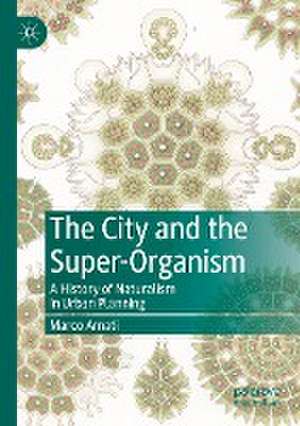The City and the Super-Organism: A History of Naturalism in Urban Planning
Autor Marco Amatien Limba Engleză Paperback – 21 noi 2022
| Toate formatele și edițiile | Preț | Express |
|---|---|---|
| Paperback (1) | 722.55 lei 6-8 săpt. | |
| Springer Nature Singapore – 21 noi 2022 | 722.55 lei 6-8 săpt. | |
| Hardback (1) | 727.66 lei 6-8 săpt. | |
| Springer Nature Singapore – 20 noi 2021 | 727.66 lei 6-8 săpt. |
Preț: 722.55 lei
Preț vechi: 881.15 lei
-18% Nou
Puncte Express: 1084
Preț estimativ în valută:
138.26€ • 144.65$ • 114.85£
138.26€ • 144.65$ • 114.85£
Carte tipărită la comandă
Livrare economică 02-16 aprilie
Preluare comenzi: 021 569.72.76
Specificații
ISBN-13: 9789811639791
ISBN-10: 9811639795
Pagini: 200
Ilustrații: XIX, 200 p. 36 illus., 17 illus. in color.
Dimensiuni: 148 x 210 mm
Greutate: 0.3 kg
Ediția:1st ed. 2021
Editura: Springer Nature Singapore
Colecția Palgrave Macmillan
Locul publicării:Singapore, Singapore
ISBN-10: 9811639795
Pagini: 200
Ilustrații: XIX, 200 p. 36 illus., 17 illus. in color.
Dimensiuni: 148 x 210 mm
Greutate: 0.3 kg
Ediția:1st ed. 2021
Editura: Springer Nature Singapore
Colecția Palgrave Macmillan
Locul publicării:Singapore, Singapore
Cuprins
Prologue.- Introduction.- A city for ‘natural man’.- From an exterior to an interior urban gaze.- The vital city.- Evolving the city.- Urban social hygiene.- The city of organic regularity.- Planning natural communities with open space.- European medicine for American urbanism.- Conclusion: a renewed direction for naturalism in planning.
Recenzii
“The book is overall a great tool to think about the complex narrative relationship between city planning and the sciences, its risks and potentials, which can inform today’s understanding of trends such as ‘urban acupuncture’ … .” (Margherita Tess, Urban Studies, Vol. 60 (6), 2023)
Notă biografică
Marco Amati teaches urban planning at the Centre for Urban Research at RMIT University in Melbourne, Australia. His research interests include understanding urban planning history and mapping the benefits of urban forests.
Textul de pe ultima copertă
This book traces how naturalism—the idea of a common theory uniting natural social systems—has contributed to major shifts in urban planning. Beginning in the 17th century, when the human body began to emerge as an inspiration for urban planning, the book examines the work of medical analyses of city life. Responding to the 19th century industrial revolution and 20th century modernism, the Second World War and mass motorisation, Dr Marco Amati shows how vitalism, eugenics, evolutionary theories and medical treatments were applied to understand cities and propose new urban forms. While critically evaluating the uses of naturalism, Amati also observes a renewed interest in the application of sciences to analyse city life, arguing that this is essential to help resolve challenges of human-induced climate change.
Caracteristici
Offers a timely contribution building on recent works that demonstrate the power of ‘biological thinking’ Uniquely conceives of biology in city planning, infrastructure, housing and human relationships Comprises a cutting edge resource for researchers and students
